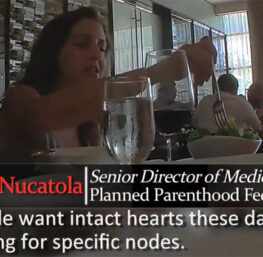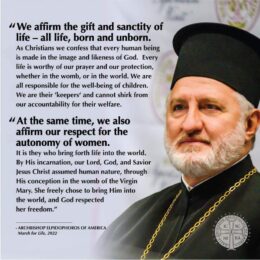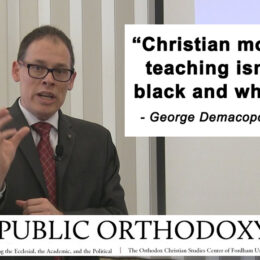Unborn children feel pain during the abortion.
Steven Ertelt
September 2, 2004
Washington, DC (LifeNews.com) — A leading pro-life organization says that the recent decision by a federal judge in New York calling the ban on partial-birth abortions unconstitutional points to the need for a bill to help women considering abortion understand the pain such abortions cause unborn children.
The National Right to Life Committee sent a letter to members of Congress on Wednesday urging them to support the Unborn Child Pain Awareness Act (H.R. 4420).
“[E]very day in the United States unborn children are subjected to trauma that causes them excruciating pain, and that would be illegal if inflicted on animals in commerce or research,” the letter says.
When a woman is considering an abortion “20 weeks after fertilization,” abortion practitioners are required to provide women with information about the pain an unborn child experiences during an abortion.
The woman can then request that the unborn child be given pain medication prior to the abortion, the letter explains.
Read the entire article on LifeNews.com.




As a staunch pro-life supporter, I am reconsidering my vote for George W. Bush. Reports alleging that President Bush paid for an illegal abortion of a 15 year-old girl he impregnated in 1970 is disturbing. If this is true, I’d rather vote for a pro-choice candidate (who is personally opposed to abortion) rather than a person who claims they are pro-life but in reality has actually paid for an abortion.
Julie, while I can understand your horror with Pres. Bush if he did indeed pay for an abortion, people can and do change. In the 1970’s, I too was perfectly willing to pay for an abortion. By the grace of God, I didn’t impregnate anyone, despite the fornication I engaged in, but that matters little, I had the criminal intent and would have carried through on it.
Later on in my life, I discovered Jesus Christ and some years after that the Orthodox Church. Repentance does heal and God does forgive. Kerry has routinely voted for mesasures that not only protect abortion, but expand it. IMO his denial that he does not personally favor abortion is disengenious.
This seems like an example of how people interested in defending morality, end up instead just defending mush by way of their political involvement.
“The National Right to Life Committee”…. taking painless abortion to the next level.
Now people can feel better about abortion because it will be made more “humane”.
Some people may admit that they are killing their children, but now they will feel good and socially responsible about it. The new good-housekeeping sign of approval on abortions will be “cruelty free”.
In regards to the abortion issue that embattles the religious right, I have often wondered how many people who have abortions even consider themselves Christian, and for that matter, who call themselves Orthodox Christians. To me, that would seem to be the more important issue for the Church. Although I am sure that there are professing Orthodox Christians who have abortions, I would suspect that the vast number of people having them are not even professing Christians.
Certainly the Church upholds the sanctity of life, but only from within the Church. The Church teaches that the path outside of Her protection leads to deception, death and destruction. It should not be suprising then that people outside of the Church are killing their own children.
It is always a temptation to look at someone else’s sins, rather than one’s own. It seems easier to be aghast at the horror of abortion than to be aghast at the horror of one’s own sinful desires which could lead someone into having an abortion.
Stephen,
Are you advocating that the Church and her children should stay aloof from any direct involement in cultural, political, and social debates? Prof. B in his post seemed to say that is a viable option. https://www.orthodoxytoday.org/blog/index.php?p=437#comment-1714
I would like to see you expand on the thesis of your post #5 as it seems ripe for good discussion.
One of the reasons it is important to publicize the fact that the unborn experience pain is that it causes the born to identify with their plight. A second reason is that is shows the profound inconsistency in American law and society. Third, it helps underscore the true and despicable horror of abortion. Finally, it tells the story of the vicitims of the American holocaust whose lives are worth remembering. There is nothing humane about any abortion.
Thanks for this post.
Let me second the request above, that Stephen expand on his point. Because the idea I read being expressed here are exactly what frustrates me so much about the Orthodox. It is that “We are the Orthodox Church, we have the Truth, and if you’re not part of the Orthodox Church than you have no part of the Truth, and, well, you can just go straight to Hell, we don’t want anything to do you.”
What does it matter that some who have abortions are outside the Orthodox Church? What does it matter if even most of those who have abortions are outside the Orthodox Church? And what is this nonsense that the “the [Orthodox] Church upholds the sanctity of life, but only from within the Church?” Does this mean that the various Orthodox Churches should only concern themsevles with Orthodox Christian women and children?
Whatever happened to being the salt of the earth? Or are we supposed to withhold our “salt”, i.e., our witness, until the masses convert to Orthodoxy?
People don’t convert to “Orthodoxy,” they convert to Christ. All too often claims of the “truth of Orthodoxy” masks a triumphalism that draws one away from Christ, because it draws one away from the neighbor. And if we don’t love the neighbor, then we incur judgement the Gospel says. I don’t see it written that love for the neighbor is confined to your Orthodox neighbor only.
Fr. Hans,
My take on a problem of triumphalism in Orthodoxy concerns Orthodox involvement in politics. Although I’m not necessarily against Christians involving themselves in politics, there does seem to be the danger of Christians presuming that they have all the right answers and values and thereby hitting other people over the head with “Orthodox” legislation (that almost sounds like Calvinism). To be sure, the Church has done this in the past, but with very mixed and often disastrous results. We can point to the problematic nature of Christian empires. If the Church does have anything to offer in the realm of government and politics, perhaps it would be a long history of failures, and a history of failures is a very valuable thing in itself.
To clarify, I’m very much in favor of people or groups which provide counseling and support for alternatives to abortion. I believe the Church should be in the forefront of providing this. Hopefully this can provide women in desperate circumstances a real choice, instead of the only feasible option that society usually presents to them of abortion. I think the moniker of “pro-choice” is much better suited to Christians, because Christianity actually offers people a real choice. It would be nice if Christians could reclaim that.
Daniel,
The point I was trying to express about “the Church upholds the sanctity of life, but only from within the Church” is that an understanding of the sanctity of life is completely dependent on Christ and His Church. To discuss a “sanctity of life” that exists separately from the Church strikes me as questionable. Christians can affirm that all of life is sacred unto God. If a Buddhist makes the same claim, I wouldn’t say that they are wrong, but I would question how meaningful such a statement could be.
I admit that I am suspicious of the “pro-life” movement’s constant use of the term “sanctity of life”, because it seems to be over-actively used by an entity outside of the Church. This just makes me wonder how meaningful the term, as used, is.
Who (not what) do you mean by “the Church”?
Fr. Hans,
I do consider the unborn a part of the Church. Perhaps that is incorrect theology, I don’t know.
Would this be the unborn children of only Church members or all the unborn?
Fr. Hans,
I consider all of the unborn a part of the Church.
Not too sure what you mean by “part of the Church.” Could you elaborate?
Fr. Hans,
I suppose one might say that because the unborn have not been born again or baptized, then they are not a part of the Church. Yet this seems ridiculous and backwards. It is not possible to baptize the unborn. They are hidden from man and in communion with God. Neither can they be baptized, nor do they need to be. They are closer to God than the rest of us who need to be baptized. In this way I consider all of the unborn a part of the Church.
The point I am driving it is why wouldn’t the commandment not to kill only apply to those “in the Church?” I think by “in the Church” you really mean “in Christ.”
Fr. Hans,
Thank you for your comments…the unborn “in Christ” are not fully present in the Church then until Christ’s return. This makes better sense to me, if I’ve understood you correctly.
Though the law of “thou shall not kill” was initially only presented to God’s people, now, as Christ is the fulfillment of the law, through Him the law is brought to everyone. All are then called to be God’s people. All are called to be like Christ, and by the grace of the Holy Spirit, not to murder. This grace is wonderful, not only for us murderers, but also for those that we would otherwise murder.
Without Christ, however, the meaning of the law changes. Instead of being a message of divine hope and love, it can become a message of earthly condemnation, fear and selfishness. “Thou” can become understood as a reference mainly to everybody else, and “thou shalt not kill” can become understood as “thou shalt not kill me” and “thou shalt also not kill my family, friends, church, dog, and weekend”. Without Christ, even “thou shalt not kill my unborn” takes on this same meaning of condemnation, fear, and selfishness. The law’s meaning is hidden from those who have not received a revelation that Christ is God.
The Church then has the charge to proclaim “thou shalt not kill” as a Gospel message of love and hope, not as a testament of condemnation, selfishness, and fear. It seems that the Church would not want the law presented, then, if it is presented without Christ. But, it seems that this is exactly what earthly governments do. Earthly governments present the law without Christ; or rather they seek to proclaim the law as “Christ”. As Christians, we are called to be obedient to our government as we are called to be obedient to Christ. However, it seems dangerous to try to consciously seek to “Christianize” our governments, because then there seems to be the danger of creating or acknowledging a substitute for Christ. I think this is what makes me skeptical of the political aspects of the “pro-life” movement.
Bill?